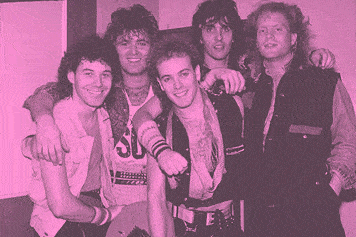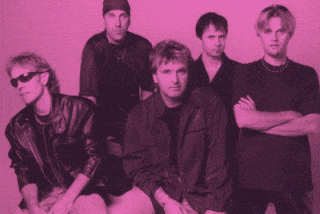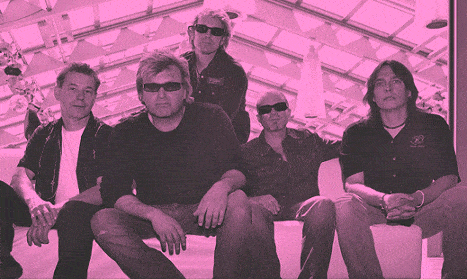 They went into Toronto’s Phase One Studios in the fall of ’83 and during that time added Ray Coburn on keyboards and although John Finnerty and Brian Brackstone (the producer for Lennex‘s only indie 45) served as bassplayer on the album, Gary Lalonde, ex of Rose & Toronto, was hired before the release in June of ’84. Their self-titled debut shot up the charts, eventually going platinum, with Dee’s instantly recognizeable voice leading the way. The band’s lendability to video and on the back of the mega hits “New Girl Now”, featured on TV’S ‘Miami Vice’ and “Burning In Love”, also made them staples of MuchMusic and MTV. Produced by Tom Tremeuth, who was behind the radio contest submission, it became one of Canada’s most successful debuts of all time. “Stay In The Light” and “Wave Babies” carried on the debut’s success, making it four straight gold singles and earning them a nomination for most promising group at that year’s Juno Awards in the process. For the better part of 2 years they toured non-stop all across the continent, backing up such artists as April Wine, Laura Branigan, Jethro Tull, Billy Idol, The Kinks and Bryan Adams. The time on the road was spent writing the basics to the next album, recorded in Long Island, NY and Little Rock Studios in Vancouver. THE BIG PRIZE was released Valentine’s Day ’85, a ploy attempted but not pulled off the year before with their debut. With famed duo Bruce Fairbairn and Bob Rock of Payolas behind it, it turned platinum practically over night, riding the singles “Bad Attitude”, the second track to make its way onto ‘Miami Vice’, “Feel It Again”, and “All Along You Knew”, which featured Jethro Tull’s Ian Anderson on flute. “I think it’s one of our best records,” Grehan stated. “I think the songs are very strong and the production is huge. it doesn’t get any better than having Bruce Fairburn and Bob Rock working on the same record.” The band spent the next year on the road with Heart, .38 Special, ZZ Top, Journey, Starship, and Saga. Grehan and Dee also lent a hand in the charity field that year, writing “Action Speaks Louder than Words”, an instrumental sold on behalf of The Food Banks of Canada. Their second straight world tour was under way by the time “What Does It Take” became the fourth single, featured in the movie “One Crazy Summer”. They shared the stages with the likes of Heart, ZZ Top, Foreigner, Aerosmith, Journey and Saga, and saw them replace Coburn with new keboardist Rob Preuss, recently ex of The Spoons. Again their name was on the nominations at the Junos, winning Group of The Year in ’86. By Christmas Lalonde and Dee had also contributed to another charity album, writing “I Am Your Child” for Variety Clubs International. Following the tour the band appeared on its second movie soundtrack, penning the title theme to the Glover/Gibson blockbuster “Lethal Weapon”. “We got the track through our label Warner Bros. in LA at the time. They thought we would be the right band to record the song and it was also our first chance to work with Ted Templeman,” Grehan said. They won a gold award for ‘Best Live Act’ at the World Popular Song Festival in Tokyo, and a Juno for ‘Group Of The Year.’ After a much deserved break from the road, the band went to LA for the next project, RACING AFTER MIDNIGHT in 1987. With new keyboardist Rob Preuss (Spoons), they flew to LA and recruited Templeman to produce it, whose most noteable work included The Doobie Brothers and Van Halen, among others. But while there, Dee was involved in a car accident, resulting in surgery on his leg and causing delays in production. This prompted Templeman to call Coburn returned to man the keys just prior to WEA releasing THE SINGLES in ’89. The greatest hits package also contained a pair of new tracks which head office hoped would make a dent in the US market. Again Templeman was used as producer for “Still Lovin’ You” and “Long Way”. Following Betts leaving the band to pursue outside interests, which now include working for SOCAN, and Lalonde following him out the door soon after, the band took their longest time yet preparing for the next release. They returned to the friendly confines of Toronto’s Phase One Studios and MONSTERS UNDER THE BED hit the shelves in ’91, marking the first time working with producer Paul Northfield. The new lineup featured Steve Webster (Billy Idol’s band) on bass and veteran drummer Jorn Anderson, and quickly got their feet wet as a unit in preperation for another run at world conquest. The singles “Say You Don’t Know Me” and “The Road” marked the band’s return to mainplay on the airwaves, and the writing behind “Bring On The Night”, “Little Sister” and “Miracle” was considered among the band’s best. Another North American tour ensued with another push to crack the American market. But by this time the band’s putting up with management’s expectations reached it’s end. Still, the band finished out the tour also despite having to bring in new memers again to fill out the roster after Betts and Lalonde parted ways with the group. Parts of these shows were combined with some from the subsequent UK run – winding up as 13 LIVE. Released on the independant Interplanetary Records, it was met with somewhat mediocre fanfare, despite being one of ’93’s sleeper hits in a year that begged for something special. The band’s live shows had reverted to a sound closer to their raw roots, and the live versions of “Bad Attitude,” “New Girl Now,” and “Say You Don’t Know Me” made it one of the better live records in rock’s recent history. Differences with management however again left the band without a deal by year-end. They continued to play the circuits to keep their name prominenet, but by the spring of ’94, only the core of the group remained again. While Dee was recording Grehan commented the band’s sound is simply a culmination of everyone’s musical interests that happens to gel well. “My influences had always been melodic rock. everything from Deep Purple, Alice Cooper, Kansas, Santana and on and on. Later on I got into Stevie Ray, Van Halen, Peter Gabriel and others,” he said. “The sound of HMS is a combination of my style of writing, coupled with Johnnie’s voice and Ray’s big keyboard sound. Nothing was ever planned or contrived about our sound, its just what happened when you mixed the ingredients together.” He continued that for the most part, the way he and Dee have written songs hasn’t changed since they first started collaberating, one of the keys to the band’s longevity. “For the most part, the bulk of the songs are written by me. I’m pretty meticulous about the process and I like to bring in a song as close to being finished as possible. With every song I have a concept of how I hear it and how I want it to sound when its recorded. I’ve also collaborated with Johnnie on a lot of things as well.” They went back to Phase One in the spring of 2001 and laid the groundwork for their next project, though still shopping around for a label. The new lineup was finalized with Nunn returning on drums, bassist Rob Laidlaw and Bret Carrigan on keyboards. After bringing the roofs down during their cross-country tour later that year they signed a deal with Bullseye Records, Canada’s biggest indie label. European distribution was handled by Frontiers Records out of Italy. The much anticipated return of the band happened in March of 2002, when LEMON TONGUE was released to rave critical reviews, despite it not exactly being the band’s personal favourite. Still, bristling with energy and with a maturity in the writing, the lead single “The Way I Do”, the title track, “Don’t Make Me Want You” and “Into Me Into You” show a band that’s stood the test of time and ready to reclaim the airwaves. “LEMON TONGUE was our first independent, low budget lp, and I hope it’s our last under those conditions,” Grehan joked. “We did it all ourselves on a shoestring ’05 was a busy year for the band album-wise. DREAMLAND was released in Europe only, more or less a remix of LEMON TONGUE with a few surprises, featuring the lead-off “What I Know,” a remix of “Still Lovin’ You,” previously unavailable except as a b-side, “The Way I Do,” “Radiant” and the title track. hortly thereafter they released the appropriately titled HONEYMOON SUITE LIVE which featured 12 of the songs that made them one of the biggest on the scene for so long, also a European only release, as they were all on a European label for that market. Warner took advantage of the back catalogue and then released a ‘best of’ package called THE ESSENTIALS before year’s end. 2007 marked a full fledged reunion of the five original members to rave reviews, as well as a complete greatest hits package called FEEL IT AGAIN – AN ANTHOLOGY, a double disc set which also included eight previously unreleased tracks. “We didn’t want to just do another greatest hits collection. We wanted to give something back to the fans that had stuck with us, as well as give something new to new fans. That was really important to us,” Grehan said. With Coburn again leaving to do his own thing, Nunn returned, and in the fall of 2008, CLIFTON HILL was released, heralded as one of the best ‘lesser known’ records in years. Backed by the strength of tracks like the lead off “She Ain’t Alright,” the snappy guitars in “Riffola,” “Restless” and the tender “Why Should I?”, it marked a record full of tight hooks, smooth melodies and the experience of one of Canada’s top musical talents. “I think HMS will be remembered as one of the major influences in Canadian rock along with Loverboy, Glass Tiger and the like,” Grehan noted. “To me the true measure of the quality of your music is longevity. We are still getting a ton of airplay some 25 years later and loyal fans out to shows … Not many bands can say that – -again it’s the music. I can listen to the Police, Led Zeppelin or The Beatles and it still sounds just as vibrant to me 30 years later.”
|
 on Doobie Brother and friend Mike MacDonald to help out with production, writing and background vocals. “Love Changes Everything” showed a heavier side to their hard-pop sound, with Grehan’s guitarwork shining through. It was soon followed up by “It’s Over Now” and then “Looking Out For Number One”. Making it their third straight platinum record. Dee’s injuries now healed, they toured Europe with
on Doobie Brother and friend Mike MacDonald to help out with production, writing and background vocals. “Love Changes Everything” showed a heavier side to their hard-pop sound, with Grehan’s guitarwork shining through. It was soon followed up by “It’s Over Now” and then “Looking Out For Number One”. Making it their third straight platinum record. Dee’s injuries now healed, they toured Europe with  SONGS IN DEE under his real name, Coburn left for the second time to work with
SONGS IN DEE under his real name, Coburn left for the second time to work with  budget and I tried to make it sound as good as possible with what I had to work with. I don’t care what anybody says, you can not make a world class record without a proper budget and top people working on it.”
budget and I tried to make it sound as good as possible with what I had to work with. I don’t care what anybody says, you can not make a world class record without a proper budget and top people working on it.”


